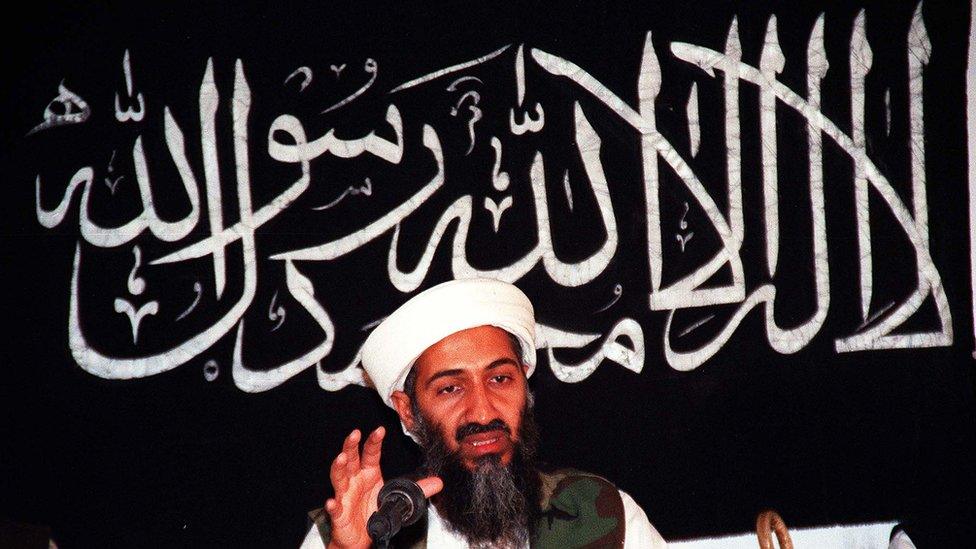Bin Laden: US offers reward for Osama's son Hamza
- Published
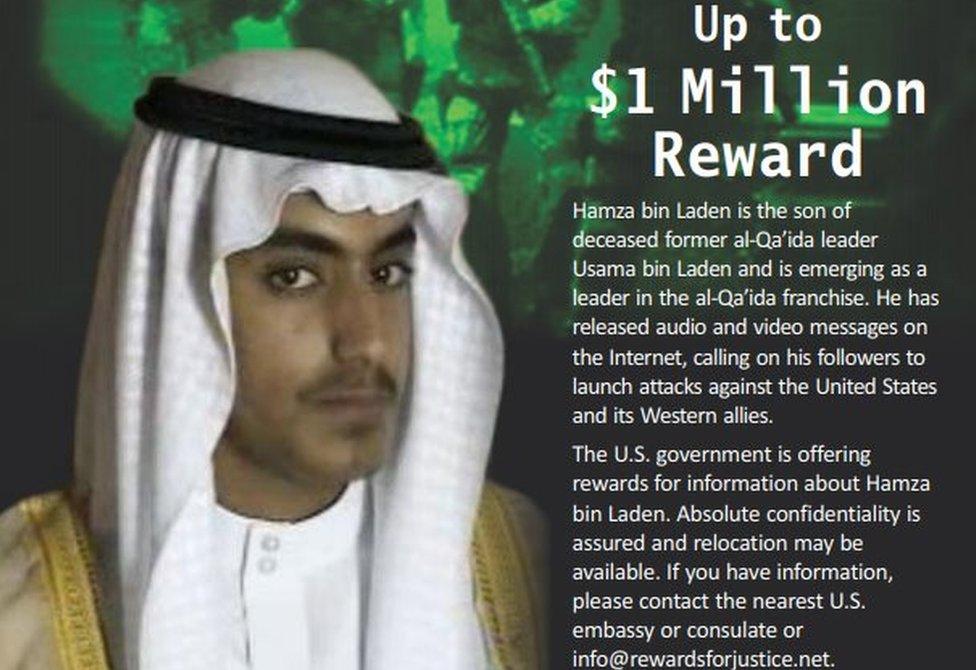
Hamza Bin Laden's whereabouts are not known
The United States is offering a reward of up to $1m (£750,000) for information about one of the sons of the late al-Qaeda leader Osama Bin Laden.
Hamza Bin Laden is emerging as a leader of the Islamist militant group, officials say.
He is thought to be based near the Afghan-Pakistani border.
In recent years, he has released audio and video messages calling on followers to attack the US and its Western allies in revenge for his father's killing.
In 2011, US special forces killed Osama Bin Laden in a compound in Abbottabad, Pakistan. He approved the attacks on the US on 11 September 2001, in which nearly 3,000 people were killed.
On Friday, Saudi Arabia's interior ministry announced it had stripped Hamza Bin Laden of his citizenship.
In March 2018, he appeared in an audio message urging citizens of Saudi Arabia to prepare for jihad against their monarchs.
What is known about him?
Hamza Bin Laden, who is believed to be about 30 years old, was officially designated by the US as a global terrorist two years ago.
The US state department says he married the daughter of Mohammed Atta,, external who hijacked one of the four commercial aircraft used in the 2001 attacks, and crashed it into one of the World Trade Center towers in New York.
Allow X content?
This article contains content provided by X. We ask for your permission before anything is loaded, as they may be using cookies and other technologies. You may want to read X’s cookie policy, external and privacy policy, external before accepting. To view this content choose ‘accept and continue’.

Letters from Osama Bin Laden seized from his compound indicated that he had been grooming Hamza, thought to be his favourite son, to replace him as leader of al-Qaeda.
Hamza Bin Laden is believed to have spent years with his mother in Iran, where it is thought his wedding took place, while other reports suggest he may have lived in Pakistan, Afghanistan or Syria.
Footage showing Hamza's wedding was made public by the CIA in 2017
"We do believe he's probably in the Afghan-Pakistan border [sic] and... he'll cross into Iran. But he could be anywhere though in... south central Asia," said Assistant Secretary for Diplomatic Security Michael Evanoff.

The Al-Qaeda threat is not going away
Analysis by Frank Gardner, BBC Security Correspondent
US counter-terrorism officials have been growing increasingly concerned that Hamza Bin Laden could emerge as a charismatic leader of a revitalised al-Qaeda.
After the killing of Hamza's father, Osama, by US Navy Seal commandos in Pakistan in 2011, al-Qaeda was largely eclipsed by its even more fanatical rival, the Islamic State group (IS).
The nominal al-Qaeda leader, Ayman al-Zawahiri, is a dull, bespectacled Egyptian strategist who has failed to inspire. But western intelligence figures, including MI6 chief Alex Younger, warn that al-Qaeda has not gone away.
It has used its recent low profile to rebuild and reorganise, planning more attacks on the West and its allied governments across the Middle East and Africa.
Al-Qaeda always said it was a mistake for IS to declare a physical caliphate which could then be attacked by a US-led coalition.
They were proved right and now both organisations present an ongoing threat of terrorist attacks.

Al-Qaeda: The basics

Osama Bin Laden near Kabul in 2001
Emerged in Afghanistan in the late 1980s, as Arab volunteers joined US-backed Afghan mujahideen fighting to expel the occupying Soviet forces
Osama Bin Laden set up an organisation to help the volunteers, which became known as al-Qaeda, or "the base"
He left Afghanistan in 1989, returning in 1996 to run military training camps for thousands of foreign Muslims
Al-Qaeda declared "holy war" on Americans, Jews and their allies

'A strategic pause, not a surrender'
The US-led war in Afghanistan following the 2001 attacks toppled the Taliban regime which had given Osama Bin Laden and his group sanctuary.
In recent years, al-Qaeda was overshadowed by IS, which attracted global attention, fighters and funds, and carried out a number of attacks on Western targets and allies.
"Al-Qaeda during this period has been relatively quiet, but that is a strategic pause, not a surrender," said US Co-ordinator for Counter-terrorism Nathan Sales.
"Today's al-Qaeda is not stagnant. It's rebuilding and it continues to threaten the United States and its allies.... Make no mistake, al-Qaeda retains both the capability and the intent to hit us."
- Published2 November 2017
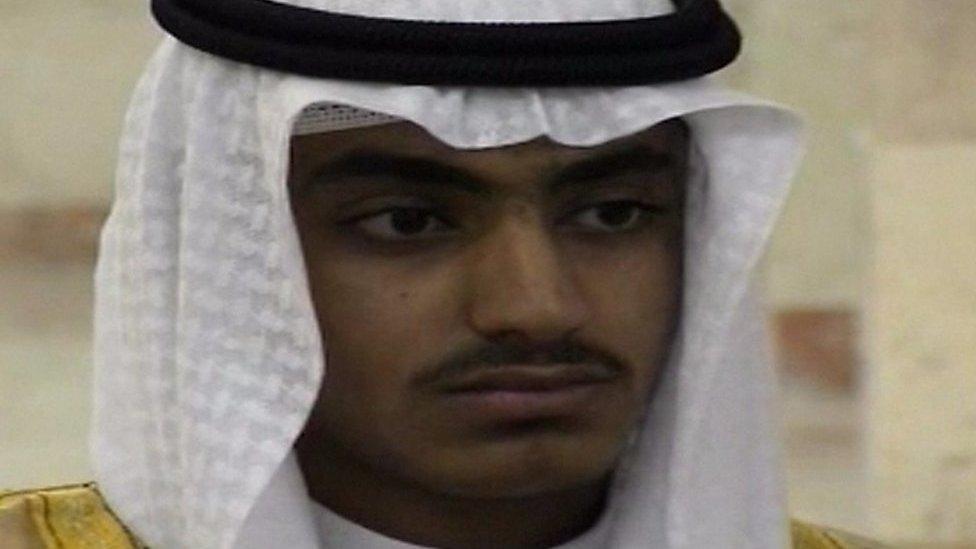
- Published14 August 2015
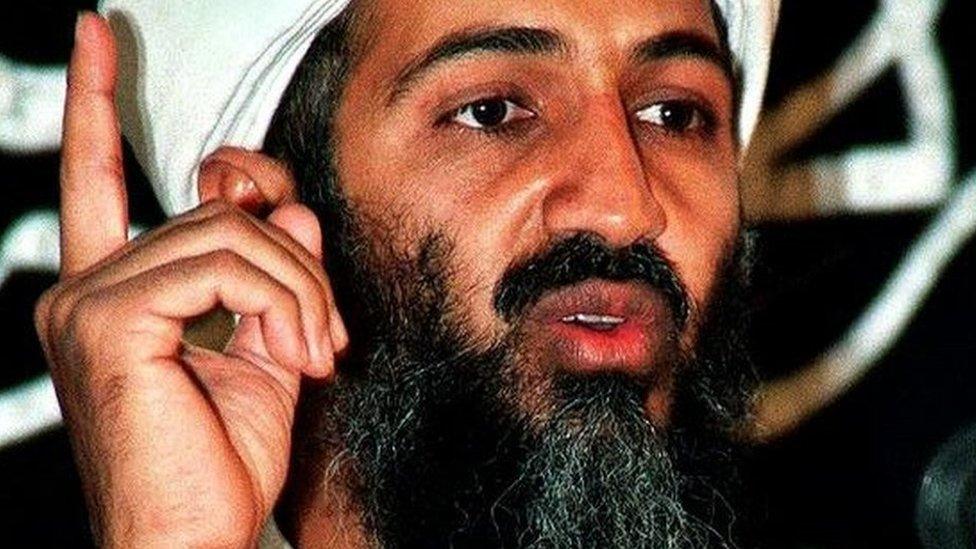
- Published2 May 2016
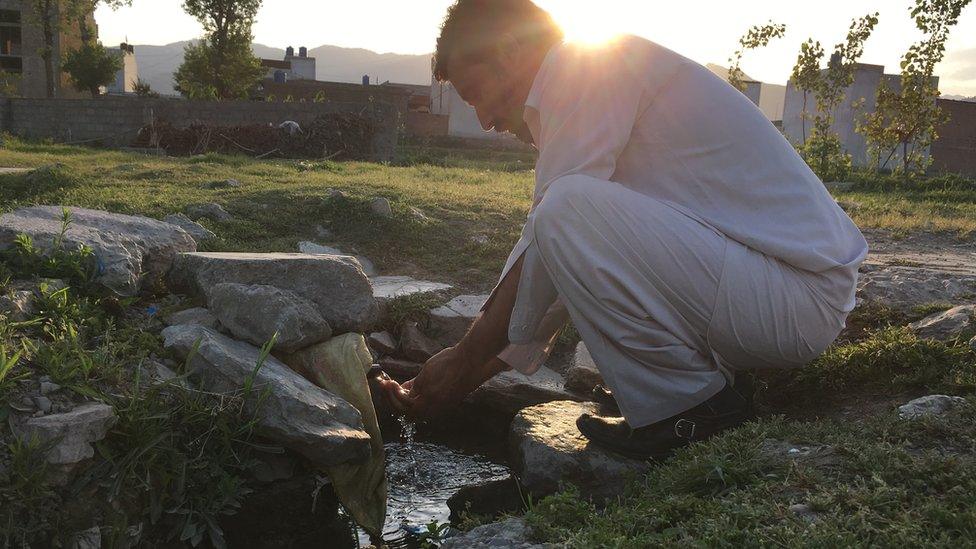
- Published6 April 2016
